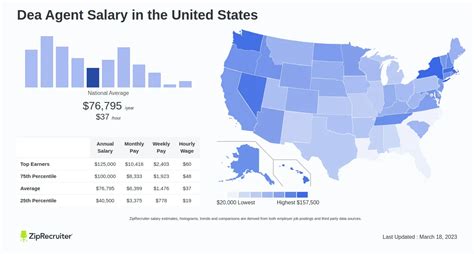A career as a Special Agent with the Drug Enforcement Administration (DEA) is one of the most challenging and rewarding paths in federal law enforcement. It demands immense dedication, sharp intellect, and physical fortitude. For those who meet these high standards, the DEA offers not only a profound sense of purpose but also a competitive and structured compensation package. While starting salaries typically begin in the range of $55,000 to $69,000, a mid-career agent in a major U.S. city can expect to earn well over $150,000 annually when all factors are considered.
This article provides a data-driven look into the salary for a DEA agent, breaking down the official government pay scales, influential factors, and long-term career outlook.
What Does a DEA Agent Do?

Before diving into compensation, it's important to understand the role. A DEA Special Agent is a federal law enforcement officer responsible for investigating and combating major narcotics trafficking, both domestically and internationally. Their duties are complex and varied, often including:
- Conducting complex criminal investigations.
- Gathering and analyzing intelligence on drug trafficking organizations.
- Performing undercover operations and surveillance.
- Arresting suspects and executing search warrants.
- Collaborating with state, local, and international law enforcement partners.
- Testifying in court as an expert witness.
This high-stakes work is why the compensation structure is designed to attract and retain highly qualified individuals.
Average DEA Agent Salary

Unlike private-sector jobs, DEA agent salaries are not based on negotiation but are determined by the federal government's General Schedule (GS) pay system. New agents are typically hired at the GL-7 or GL-9 pay grade.
According to the U.S. Office of Personnel Management (OPM) 2024 pay scales, the base salary for these starting grades is:
- GL-7: $49,024 to $63,732 per year
- GL-9: $59,966 to $77,955 per year
However, this base pay is only the beginning. The actual take-home pay is significantly higher due to two critical additions:
1. Locality Pay: An adjustment based on the cost of living in the agent's assigned duty station, which can add anywhere from 16.82% to 44.15% to the base salary.
2. Law Enforcement Availability Pay (LEAP): A 25% premium on top of base and locality pay, compensating agents for the long and unpredictable hours required by the job.
With these additions, a new agent's starting salary is more realistically between $70,000 and $95,000, depending on location and qualifications.
Experienced, non-supervisory agents typically progress to the GS-13 level. A GS-13 agent's total earnings, including locality pay and LEAP, can range from approximately $125,000 to over $170,000 per year. Salary aggregators reflect this reality; for instance, Salary.com reports the median salary for a "Special Agent" in the U.S. to be around $113,991, with the top tier earning over $140,000.
Key Factors That Influence Salary

Several key factors determine an agent's specific salary and earning potential throughout their career.
### Level of Education
Your educational background is a primary factor in determining your starting pay grade. To qualify for the DEA, a bachelor's degree is the minimum requirement.
- To start at the GL-7 grade: A bachelor's degree with "Superior Academic Achievement" (a 3.0+ GPA) or one year of graduate-level study is typically required.
- To start at the higher GL-9 grade: Candidates usually need a Master's degree, a Juris Doctor (J.D.), or two full years of graduate education in a related field like criminology, sociology, or law. This provides an immediate and significant salary advantage.
### Years of Experience
The federal GS system is designed to reward experience through a clear promotion ladder. Agents who perform successfully can expect regular promotions. A typical career progression looks like this:
- Trainee/New Agent: Starts at GL-7 or GL-9.
- Agent: After the first year, agents are typically promoted to GS-11, followed by promotions to GS-12 and then GS-13.
- Senior/Journeyman Agent: Reaching the GS-13 level is standard for experienced field agents and represents the full performance level for non-supervisory roles.
- Supervisory/Management Roles: Agents who move into management positions can be promoted to GS-14, GS-15, and ultimately the prestigious Senior Executive Service (SES), where salaries can exceed $200,000.
### Geographic Location
Where an agent is stationed has a massive impact on their salary due to locality pay. This system ensures that federal employees in high-cost-of-living areas have comparable purchasing power to those in less expensive regions.
For example, let's compare the 2024 salary for a GS-13, Step 1 agent (base pay: $89,835) in two different locations, including the 25% LEAP:
- Houston, TX (30.43% locality pay):
- Base + Locality = $117,163
- Total with 25% LEAP = $146,454
- San Francisco, CA (44.15% locality pay):
- Base + Locality = $129,504
- Total with 25% LEAP = $161,880
As demonstrated, an agent in San Francisco earns over $15,000 more per year for the same job due to locality adjustments. Agents may also receive additional pay and allowances for overseas assignments.
### Government Pay Structure
This is the most critical factor. Unlike a private company, the DEA's compensation is rigidly structured. Understanding the components is key:
- General Schedule (GS) Grade and Step: Your grade (e.g., GS-13) is your rank, and your step (1-10) is your seniority within that rank. You advance steps over time, providing incremental pay raises even without a promotion.
- Law Enforcement Availability Pay (LEAP): The 25% pay premium is non-negotiable and is a foundational component of a DEA agent's salary, reflecting the expectation that agents are available 24/7.
- Benefits Package: The federal government offers an exceptional benefits package that represents a significant part of total compensation. This includes a pension plan (FERS), a 401(k)-style Thrift Savings Plan (TSP) with government matching, comprehensive health and life insurance, and generous paid leave.
### Area of Specialization
While most Special Agents follow the same pay scale, certain specialized skills can enhance a candidate's application and open doors to unique career paths that may lead to faster promotions. For example, agents with fluency in a critical foreign language may be prioritized for lucrative overseas assignments. Similarly, those with backgrounds in accounting, computer science, or piloting may be selected for specialized units like financial investigations, cyber-crime, or the DEA's Aviation Division.
Job Outlook

The career outlook for federal law enforcement remains stable and essential to national security. The U.S. Bureau of Labor Statistics (BLS) groups DEA agents under the broader category of "Detectives and Criminal Investigators."
According to the BLS Occupational Outlook Handbook, employment in this field is projected to show little or no change from 2022 to 2032. However, this statistic covers all levels of law enforcement. The demand for highly qualified federal agents at agencies like the DEA remains consistently competitive due to retirements and the enduring need to combat national and transnational crime. The rigorous hiring process ensures that only the most capable applicants are selected, making it a highly sought-after career.
Conclusion

A career as a DEA Special Agent offers a salary path that is both structured and substantial. While the base pay may seem modest at first glance, the combination of mandatory locality pay and a 25% LEAP premium creates a highly competitive total compensation package.
For prospective professionals, the key takeaways are:
- Your salary is predictable and transparent, based on the federal GS scale.
- Higher education can grant you a higher starting salary.
- Your earning potential grows significantly with experience, with a clear path to a six-figure income.
- Where you work matters, as locality pay can dramatically increase your overall compensation.
For those with the dedication, integrity, and resilience to pursue this demanding career, the DEA provides a unique opportunity to achieve both significant financial security and the profound satisfaction of serving and protecting the nation.
